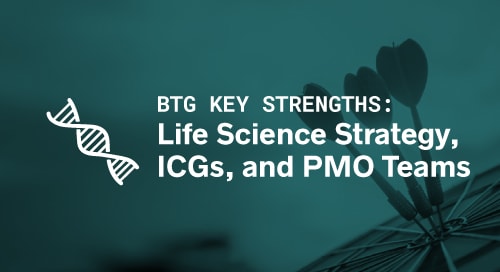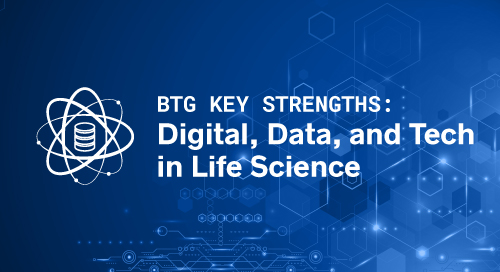
In the dynamic life science industry, change is vital to maintaining competitive advantage—whether adapting to shifting market dynamics, technological advancements, regulatory requirements, patient needs, or all of the above.
From digital transformation to organizational change and supply chain optimization to R&D innovation, large-scale transformations in the life sciences are frequently a strategic imperative for efficiency and effectiveness. Yet, successful transformations are the exception, not the rule—with only about a third resulting in sustained performance improvement, according to McKinsey.
Mapping out a plan for success starts with determining clear answers to some common questions:
- What is the purpose of the transformation?
- What is the anticipated timeline, and how quickly can new tools and processes be adopted?
- Do we have a clear strategy and approach for our vision?
- What is the budget we need to adhere to?
- Are we able to operationalize the strategy and plans?
- Do we have key stakeholders identified?
- Do we have the expertise required for success?
Large transformations don’t work as side-of-desk projects. They require experienced strategists, knowledgeable oversight, dedicated project management, and niche subject matter expertise—with a wide range of knowledge and skills required across the project timeline.
From leveraging highly specialized digital and data analytics experts to accessing experienced professionals in regulatory compliance and restructuring, the integration of on-demand talent is proving to be a key driver in navigating the complexities of transformations within this highly regulated industry.
Fast, Flexible, and Affordable: On-Demand Talent for Life Science Transformation and Change Management
It’s no surprise that process optimization and transformation ranks consistently as one of the most in-demand skills in BTG’s annual High-End Independent Talent Report. Big events like transformations, mergers and acquisitions, and reorganizations often require outside skills and expertise because reallocating existing employees can leave initiatives under-resourced and disrupt daily business activities. Other resourcing options can be equally limiting—from large consulting firms that aren’t cost effective for all needs to contingent staffing firms that aren’t built to deliver high-end talent. Even a new full-time hire will take time to make an impact and can be costly if they don’t work out.
In comparison, independent life science consultants, project managers, and subject matter experts can be deployed quickly and flexibly on demand to offer high-level strategic advice, integrate with internal teams, or drive and manage workstreams over the course of a holistic end-to-end transformation—from design and planning through implementation and scaling and sustaining.
Supporting Life Science Transformation at Every Stage
Each phase of a transformation builds upon the foundation laid by the preceding one. A meticulous approach ensures that strategic planning, stakeholder engagement, and execution align seamlessly—minimizing risks, optimizing resources, and ultimately enhancing the likelihood of achieving the transformation’s overarching goals.
With strategic resourcing, life science companies are not only able to achieve greater success at each stage, they are often able to move through the transformation process more quickly and effectively—seeing real results sooner. Let’s examine how leaders across pharma, biopharma, medical device, distribution, and healthcare companies are tapping on-demand talent every step of the way.
Developing a Vision for Success
The first phase of a transformation is crucial for laying the groundwork and determining the direction of the transformation initiative. The process begins with assessment and analysis, such as evaluating the existing state and identifying internal strengths and weaknesses, as well as external opportunities and threats.
In this phase, stakeholders are identified, and plans are made for thorough communication and sustained engagement. Vision and objectives are established, ROI and cost-benefit analyses are conducted, and risk mitigation strategies are laid out. From there, the strategic plan can be shaped and the change management framework developed. A budget must be detailed, alongside a clear evaluation of the resources needed (including talent) to execute the transformation.
Frequently, large consulting firms assist with this phase, providing deliverables to inform the vision of the subsequent phases. Independent life science talent can add a specialized layer of expertise here by offering insights into life science-specific regulatory nuances. Companies frequently tap independent experts to provide a third-party perspective, planning support, and to serve as a liaison between a consulting firm and company leadership, ensuring that the subsequent phases are well-informed, strategically aligned, and effectively executed.
In one recent case, the internal strategy and consulting group of an F500 pharma company was redesigning a customer-facing team and reached out to Business Talent Group (BTG) in need of strategic thinking and change management expertise. BTG delivered an organizational design and transformation consultant who had done similar work for other life science companies. The talent assessed the current state and then designed the potential future state vision, structure, and business processes.
Creating a Plan and the Roadmap to Get There
As a transformation progresses into the next phase, the focus shifts to translating the vision and objectives into a detailed strategic plan. In the life science industry, the planning phase of a transformation is uniquely intricate.
Industry leaders often tap independent talent to drive PMO design and project management. These consultants and experts collaborate closely with stakeholders to design a PMO and project frameworks that align with Good Clinical Practice (GCP), Good Laboratory Practice (GLP), and other industry-specific standards. They can guide the establishment of robust project management methodologies, ensuring that the transformation aligns with regulatory expectations and adheres to the highest standards of quality and compliance.
At every stage of a transformation, but perhaps most often in the planning phase, it’s valuable to bring in a PMO and subject matter expert to help support the creation of practical and impactful plans. For example, an F100 wholesale drug company was establishing an office of privacy and needed guidance for the stand-up process and expertise on compliance. BTG provided a former EY consultant with 20+ years’ experience building and managing effective compliance, ethics, and privacy programs to develop plans and procedures to ensure data protection and oversee an effective transformation.
In this stage, on-demand talent often play a crucial role in collaborating with key stakeholders to develop a roadmap that outlines specific initiatives, timelines, and milestones. This involves refining the strategic plan, further aligning it with the organization’s capabilities, and addressing any challenges identified in the initial assessment. This detailed refinement process accounts for the unique challenges and dependencies inherent to the life science industry, such as considerations for regulatory submission timelines, clinical trial milestones, and the integration of data management and analysis.
By fostering collaboration and accountability within project teams, independent professionals ensure that the roadmap is not only a guide that provides clear direction for the implementation phase, but moreover a blueprint for achieving excellence long after the transformation is complete.
Implementing Meaningful Change
In the implementation phase, expertise in change strategy and change management becomes indispensable. Working closely with internal change management teams and stakeholders, independent consultants are often tasked with conducting thorough impact assessments to ensure that changes do not compromise patient safety or data integrity and crafting communication plans that address the unique sensitivities of stakeholders in the life science ecosystem, including regulatory bodies, healthcare professionals, and patients. Industry leaders often tap independents to develop training programs to equip employees with the necessary skills to adapt to the changes introduced.
Case in point: A large life science organization was implementing a new organizational and operational framework and needed support to manage the roll-out. BTG provided a former McKinsey EM with extensive BD&L expertise and organizational change management experience. The talent drove the implementation with deliverables including a current state assessment, gap analysis, tool implementation, and training/enablement.
On-demand talent is a perfect resource to fill hands-on roles. Independent life science project managers have “been there, done that” experience, and they are equipped with the skills and knowledge necessary to step in quickly and serve as intermediaries between project teams, regulatory bodies, and PMOs, ensuring that projects are executed in alignment with regulatory submission timelines and data integrity requirements. Their contribution can ensure that the implementation phase upholds the highest standards of compliance and patient safety in the life science sector—and fosters a culture of continuous improvement within the team.
Scaling, Sustaining, and Optimizing the Transformation
The tech has been implemented, new operations have been adopted, most of the staff is trained, and leadership is evangelizing the new systems, but the transformation isn’t over. This final phase is all about measuring, improving, optimizing, and documenting the work that’s been done to ensure success.
On-demand talent remains a key resource, particularly in governance strategy, governance management, and continuous improvement. Collaborating closely with organizational leaders, independent experts are often brought in to develop decision-making frameworks that align with industry-specific regulations, define roles and responsibilities, and implement mechanisms for ongoing regulatory performance measurement.
The need for dedicated project management continues through this final phase of a transformation to support training and development, knowledge transfer, stakeholder communication, and KPI tracking.
In one case, the clinical development group of an F500 pharma company was undergoing a transformation of clinical processes with a goal of eliminating waste, reducing complexity, and increasing speed to market and patient access—and needed flexible project management across the transformation. BTG created a flexible project manager resourcing model that enabled the client to deploy a customized stable of project managers against various projects and workstreams as needs changed. Over the course of a two-year transformation, the team had five to 10 consultants deployed at any given time.
As organizations strive to navigate the ever-evolving landscape of life science transformation, the strategic deployment of on-demand talent proves to be a key differentiator in achieving sustained success and excellence—from creating the transformative vision to driving meaningful and lasting change.
Whether you need a classically trained management consultant to help you turn your vision into a roadmap or a detail-oriented project manager to manage workstreams, BTG’s talent team can help you find a perfect fit. And there’s no cost to explore a project. Reach out today to get started!
GET THE SKILLS YOU NEED
Thousands of independent consultants, subject matter experts, project managers, and interim executives are ready to help address your biggest business opportunities.





















